
- ELEMENTARY TEACHING , LITERACY

How to Teach Research Skills to Elementary Students in 2024
Research skills are incredibly important in the world we live in today. When we come across a problem or a question, what do we do? We quickly search online to find the answer. We are using our research skills while we are doing this. Read below to learn how to teach research skills to elementary students! This will help you prepare your twenty-first century learners for the ever-changing world we live in. You’ll have the confidence to create opportunities to apply these skills to research projects like this animal research project .

What are Research Skills?
Research skills is the ability to search for information about a topic, evaluate that information efficiently, and share findings in an organized way.
What Research Skills do Elementary Students Need?
Your elementary students are required to learn research skills if your state uses the Common Core or TEKS. Read below to learn what specific research standards your grade level covers.
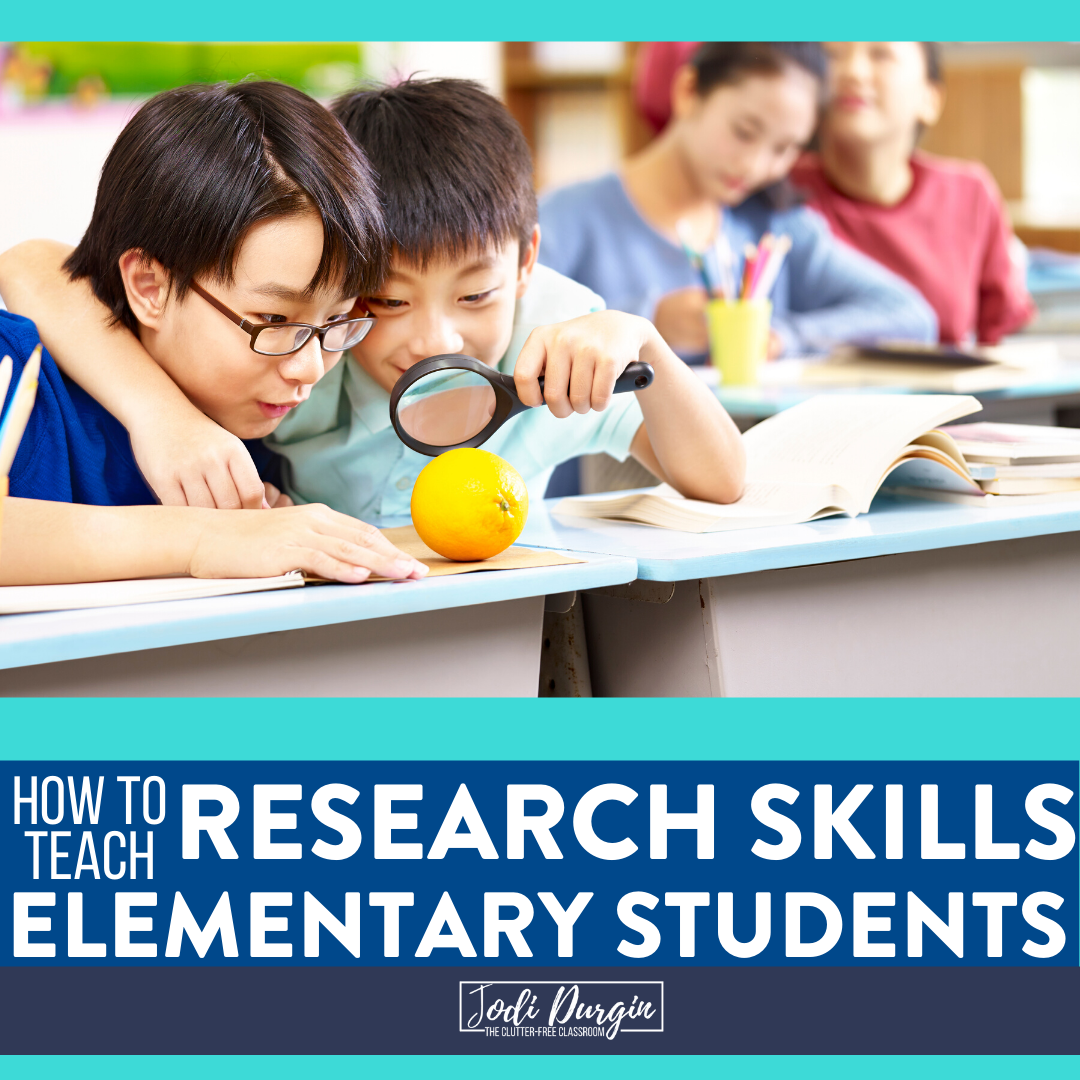
Research Standards in Common Core
The standards listed below are a good starting point for figuring out how to teach research skills to your elementary students.
Kindergarten
- ELA.W.K.7 : Participate in shared research and writing projects.
- ELA.W.K.8 : With guidance and support from adults, recall information from experiences or gather information from provided sources to answer a question.
First Grade
- ELA.W.1.7 : Participate in shared research and writing projects.
- ELA.W.1.8 : With guidance and support from adults, recall information from experiences or gather information from provided sources to answer a question.
Second Grade
- ELA.W.2.7 : Participate in shared research and writing projects.
- ELA.W.2.8 : Recall information from experiences or gather information from provided sources to answer a question.
Third Grade
- ELA.W.3.7 : Conduct short research projects that build knowledge about a topic.
- ELA.W.3.8 : Recall information from experiences or gather information from print and digital sources; take brief notes on sources and sort evidence into provided categories.
Fourth Grade
- ELA.W.4.7 : Conduct short research projects that build knowledge through investigation of different aspects of a topic.
- ELA.W.4.8 : Recall relevant information from experiences or gather relevant information from print and digital sources; take notes and categorize information, and provide a list of sources.
- ELA.4.9 : Draw evidence from literary or informational texts to support analysis, reflection, and research.
- ELA.4.9.B : Apply grade 4 Reading standards to informational texts.
Fifth Grade
- ELA.W.5.7 : Conduct short research projects that use several sources to build knowledge through investigation of different aspects of a topic.
- ELA.W.5.8 : Recall relevant information from experiences or gather relevant information from print and digital sources; summarize or paraphrase information in notes and finished work, and provide a list of sources.
- ELA.W.5.9 : Draw evidence from literary or informational texts to support analysis, reflection, and research.
- ELA.W.5.9.B : Apply grade 5 Reading standards to informational texts.
Research Standards in TEKS
The standards listed below are a good starting point for figuring out how to teach research skills to your students.
- Generate questions for formal and informal inquiry with adult assistance. (TEKS 12A)
- Develop and follow a research plan with adult assistance. (TEKS 12B)
- Gather information from a variety of sources with adult assistance. (TEKS 12C)
- Demonstrate understanding of information gathered with adult assistance. (TEKS 12D)
- Use an appropriate mode of delivery, whether written, oral, or multimodal, to present results. (TEKS 12E)
- Generate questions for formal and informal inquiry with adult assistance. (TEKS 13A)
- Develop and follow a research plan with adult assistance. (TEKS 13B)
- Identify and gather relevant sources and information to answer the questions with adult assistance. (TEKS 13C)
- Demonstrate understanding of information gathered with adult assistance. (TEKS 13D)
- Use an appropriate mode of delivery, whether written, oral, or multimodal, to present results. (TEKS 13E)
- Identify and gather relevant sources and information to answer the questions. (TEKS 13C)
- Identify primary and secondary sources. (TEKS 13D)
- Demonstrate understanding of information gathered. (TEKS 13E)
- Cite sources appropriately. (TEKS 13F)
- Use an appropriate mode of delivery, whether written, oral, or multimodal, to present results. (TEKS 13G)
- Generate questions on a topic for formal and informal inquiry. (TEKS 13A)
- Identify and gather relevant information from a variety of sources. (TEKS 13C)
- Recognize the difference between paraphrasing and plagiarism when using source materials. (TEKS 13F)
- Create a works cited page. (TEKS 13G)
- Use an appropriate mode of delivery, whether written, oral, or multimodal, to present results. (TEKS 13H)
- Generate and clarify questions on a topic for formal and informal inquiry. (TEKS 13A)
- Develop a bibliography. (TEKS 13G)
- Use an appropriate mode of delivery, whether written, oral, or multimodal, to present results . (TEKS 13H)
- Understand credibility of primary and secondary sources. (TEKS 13D)
- Differentiate between paraphrasing and plagiarism when using source materials. (TEKS 13F)
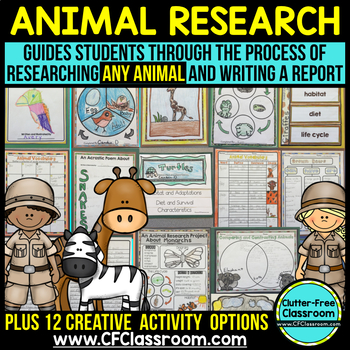
20 Research Mini Lesson Ideas
Below are 20 research mini lessons for how to teach research skills to elementary students.
- Research and What it Looks Like
- The Steps in the Research Process
- Types of Resources
- Text Features in Websites
- Finding Resources on the Internet
- Finding Information in Non-Fiction Books
- Text Features in Non-Fiction Texts
- How to Use an Encyclopedia
- Conducting an Interview with an Expert
- Reading a Newspaper and Getting Information from it
- Previewing a Text for Research
- Evaluating a Resource to Determine if it is Reliable
- Citing Sources
- Facts vs. Opinions
- Taking notes
- Paraphrasing
- Summarizing
- Organizing Information
- Writing Like an Informational Writer
- Presenting Findings
What are the Research Steps for Elementary Students?
Here are the 4 steps of the research process for elementary students:
- Choose a topic.
- Search for information.
- Organize information.
- Share information.
Ideas for Elementary School Research Topics
Below are research topic ideas for elementary students.

Animal Research Topics for Elementary Students
1. ocean animals.
Oyster, tuna, cod, grouper, shrimp, barnacle, barracuda, shark, bass, whale, lobster, starfish, salmon, clam, conch, coral, crab, sea otter, dolphin, eel, seal, sea turtle, flounder, octopus, sea star, haddock, jellyfish, krill, manatee, marlin, seahorse, sea otter, sea cucumber, sea lion, sea urchin, stingray, squid, swordfish, and walrus
2. Land Animals
Aardvark, elephant, frog, dog, tortoise, ant, anteater, antelope, fox, rabbit, baboon, camel, badger, owl, bat, bear, beaver, bison, rhinoceros, spider, bobcat, buffalo, bumble bee, butterfly, cat, chameleon, cheetah, chicken, chipmunk, cockroach, cougar, cow, coyote, gorilla, deer, donkey, dragonfly, eagle, emu, ferret, flamingo, goat, goose, hedgehog, heron, hippopotamus, horse, hummingbird, hyena, iguana, jaguar, kangaroo, koala, lemur, leopard, lion, llama, meerkat, mongoose, monkey, moth, mouse, mule, panther, parrot, peacock, pelican, peacock, pheasant, pig, platypus, porcupine, possum, puma, quail, raccoon, rattlesnake, sheep, skunk, sloth, squirrel, swan, termite, tiger, turkey, vulture, walrus, weasel, wolf, woodpecker, yak, and zebra
3. Endangered Species
Bengal tiger, polar bear, Pacific walrus, Magellanic penguin, leatherback turtle, bluefish tuna, mountain gorilla, monarch butterfly, Javan rhinoceros, giant panda, amur leopard, sei whale, Asian elephant, sumatran elephant, pangolin, African wild dog, amur tiger, blue whale, bonobo, chimpanzee, dugong, Indus river dolphin, orangutan, red panda, sea lion, vaquita, whale shark, yangtze finless porpoise, North Atlantic right whale, and yellowfish tuna
Resources for Teaching Elementary Research Skills
Below are resources for teaching elementary student research skills.
Animal Research Project
Learn more about the animal research project below!
What is the animal research project?
The animal research project is a printable and digital research project where students learn about any animal they choose. You can also choose the animals for them. The resource can be used over and over again all year long by just picking a new animal.
What grades is the animal research project appropriate for?
This resource includes tons of differentiated materials so it is appropriate for 2nd, 3rd, 4th, and 5th grade students.
What is included in the animal research project?
The animal research project includes the following:
- teacher’s guide with tips and instructions to support you with your lesson planning and delivery
- parent communication letter to promote family involvement
- graphic organizers for brainstorming a topic, activating schema, taking notes, drafting writing
- research report publishing printables including a cover, writing templates and resource pages
- grading rubric so expectations are clear for students and grading is quick and easy for you
- research activities (KWL, can have are chart, compare/contrast Venn diagram, habitat map, vocabulary pages, illustration page, and life cycle charts)
- flipbook project printables to give an additional choice of how students can demonstrate their understanding
- flap book project printables to offer students another way to demonstrate their learning
- research poster to serve as an additional way to demonstrate student understanding
- poetry activities to offer students an alternative way to demonstrate their learning
- digital version so your students can access this resource in school or at home
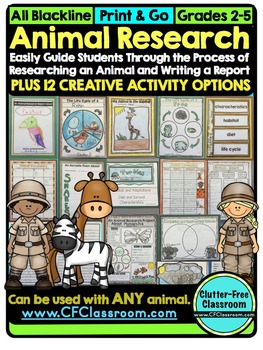
4 Research Websites
Below are 4 research websites for elementary students.
- http://www.kidrex.org
- https://www.kiddle.co
- https://www.safesearchkids.com
- https://www.kidzsearch.com/boolify/
You might also like...
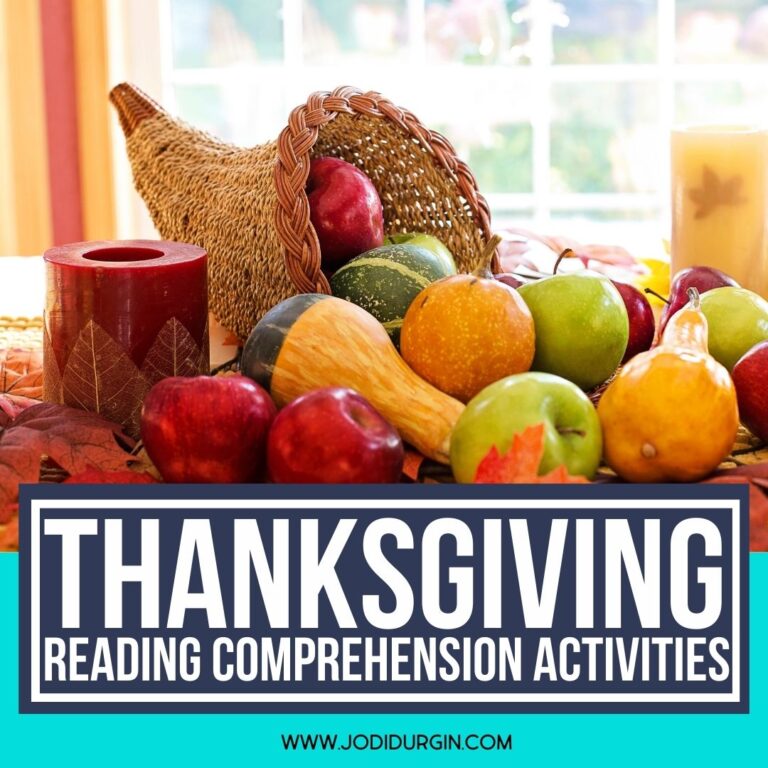
Thanksgiving Reading Comprehension Activities for 2nd, 3rd, and 4th Grade
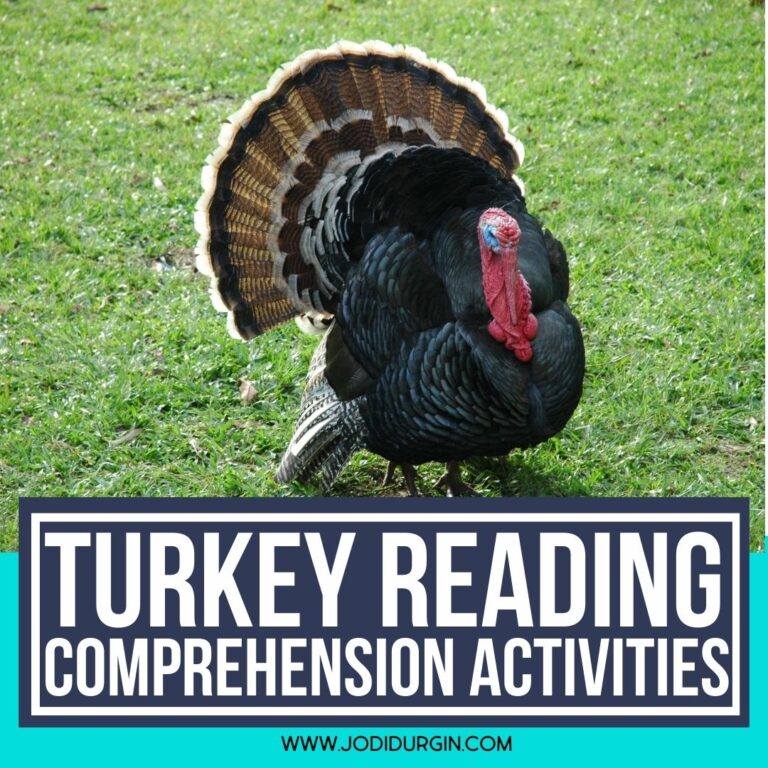
Turkey Reading Activities for 2nd, 3rd, and 4th Grade
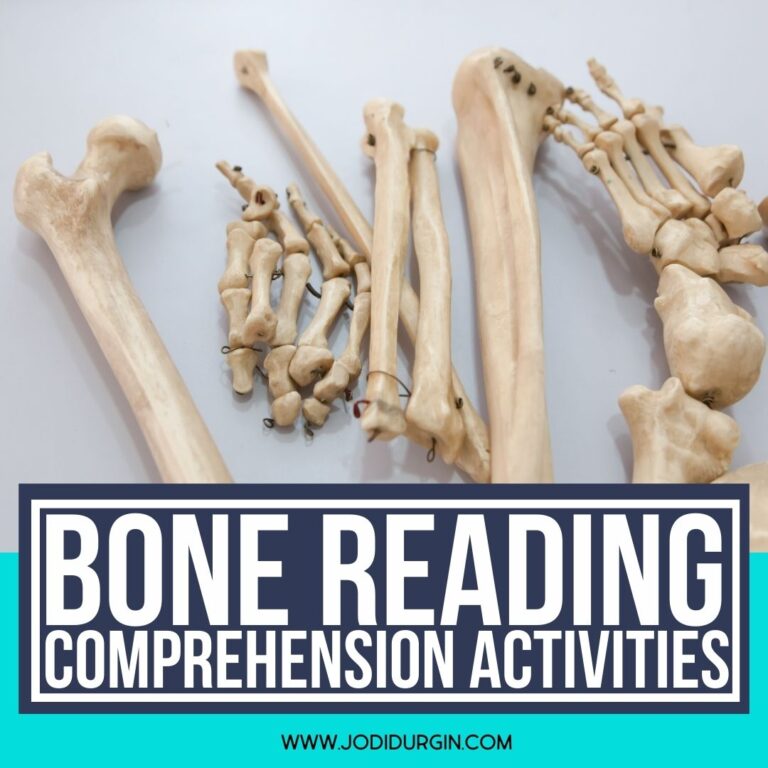
Bones Reading Comprehension Activities for 2nd, 3rd, and 4th Grade
Join the email club.

- CLUTTER-FREE TEACHER CLUB
- FACEBOOK GROUPS
- EMAIL COMMUNITY
- OUR TEACHER STORE
- ALL-ACCESS MEMBERSHIPS
- OUR TPT SHOP
- JODI & COMPANY
- TERMS OF USE
- Privacy Policy

K-12 Internet Resource Center
Free PreK-12 lesson plans, activities, and resources
50 Mini-Lessons For Teaching Students Research Skills
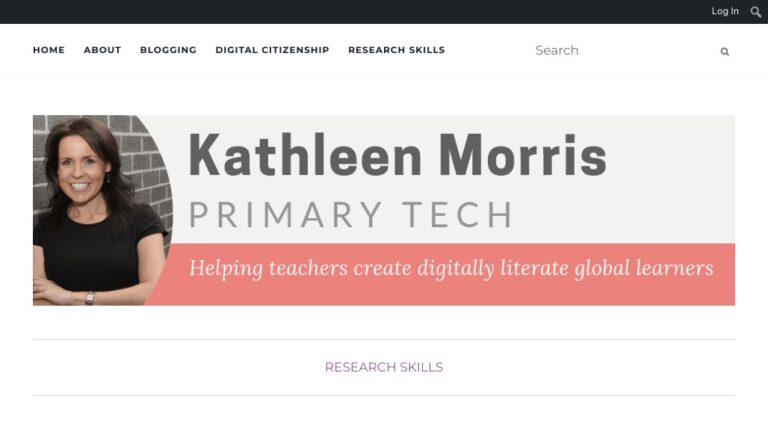
This post outlines 50 ideas for activities that could be done in just a few minutes (or stretched out to a longer lesson if you have the time!). You’ll find a PDF summary below too! This post shares ideas for mini-lessons that could be carried out in the classroom throughout the year to help build students’ skills in the five areas of: clarify, search, delve, evaluate , and cite . It also includes ideas for learning about staying organised throughout the research process.
Today’s students have more information at their fingertips than ever before and this means the role of the teacher as a guide is more important than ever. Posted on February 26, 2019 by Kathleen Morris
Attributes: 4-5 6-8 Lesson Plan
Resource Link: https://www.kathleenamorris.com/2019/02/26/research-lessons/
